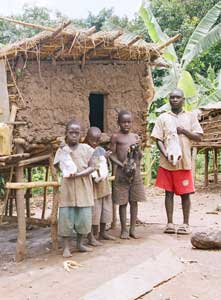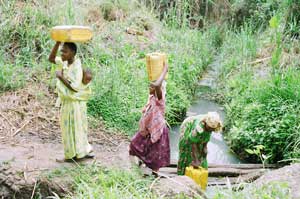Our Projects

Current Projects
Currrent Tanzania projects focus on water and health. ViNA installed 2 rain catchment systems on the dispensary and a nursing school in Mkonoo village. Before installation
of these systems, water used at the dispensary and a nursery school was full of worms and debris, and had to be strained and then boiled before use. The nursery school students
were without water until they returned home. Catch dams will soon be installed to direct runoff water during the rainy seasons and prevent further erosion. The dams will provide
locally available water for animals. Trees for the Future (TFF) has partnered with us again to provide trees, erosion control and education. ViNA is assisting with
economic development by purchasing Maasai handmade items and selling them locally. Call me or email if you are interested in the purchase of these craft items.
Sustainable Projects
Agriculture Groups
The first village to receive ViNA’s assistance was Kyabasaija.
Although Kyabasaija is the central village, ViNA’s work networks a total of 14 villages,
reaching 3,200 people.
ViNA’s approach is to create sustainable development from the ground up; assistance is
given directly to the village community. Mijumbi Gabriel, a local engineer/teacher, oversees
the current projects and assists in development of future projects.
Mijumbi works directly with the Kyabasaija Village Development Program (KVDP), an organization
comprised of community leaders from the target population. KVDP coordinates all ViNA projects,
assuring that the needs of the community are addressed and that stakeholders and major
decision makers are the community members themselves. This coordination allows
local villagers involved in the projects to have responsibility and ownership once ViNA moves on
to new partnering sites.
On-going projects include:
Animal Husbandry Groups
Groups of 4-5 are trained in to raise healthy goats, pigs,
rabbits, and chickens. A viable, productive animal program is maintained through team
efforts of diverse participants, including women, children, orphans, youth, adults and disabled
persons.
- Training Seminars: Groups trained in animal care, manure management, animal shelter improvement, and the importance of regular veterinary services.
- Animal “Seed” Center (ASEC): The demonstration site provides high quality animals for long-term sustainability of hardy, productive hybrid livestock and prevents the inbreeding that was prevalent prior to ViNA's involvement.
- In August 2009, a ViNA volunteer specializing in animal science examined the animals.
Agriculture Groups
ViNA is leading the cultivation of local crops for consumption by
villagers and animals. Villagers receive education seminars in organic farming, and will be
provided with improved seeds and better tools thanks to a grant provided by Seeds for Africa.
Technical Education
ViNA built the Hekima Technical Institute, a local
vocational school offering classes in carpentry, brick making, and tailoring. The
school provides educational and career opportunities to underrepresented groups
such as orphans who cannot otherwise afford tuition.
Latrines
Rotary LA has funded new latrines for two primary schools.
ViNA’s long term goal is to provide adequate latrines throughout the
entire community, increasing the attendance rates of girls in schools and improving overall
hygiene in the villages.

Water Project
A major contributor to illness and death is the unavailability of clean water. The only water
sources in the target villages are dirty springs and streams infested with malaria-carrying
mosquitoes. Despite substantial rainfall, the runoff is often contaminated. Women and children
walk 2 miles each day to draw water for the family from these sources and is difficult to reach,
with children at risk for slipping and drowning.
The Claremont Rotary Club is partnered with ViNA to construct 17-18 protected wells in the
villages. The Claremont Rotary Club works with the Kibaale Rotary Club in Uganda and local
engineers to assure the wells are more accessible to homes in the villages.
Water purification and expanded delivery are the next steps after our rain catchment systems.
Once installed, water purification and expanded delivery will be the next step.
Health Outreach Program
In August 2009, ViNA trained community members to become leaders in health promotion and
disease prevention. The program, led by the trained villagers, seeks to reduce the
incidence of communicable diseases in the villages through local community education in
various health-related areas such as basic hygiene and malaria prevention. Health clubs have been created
to educate villagers in the most unreachable, rural areas.